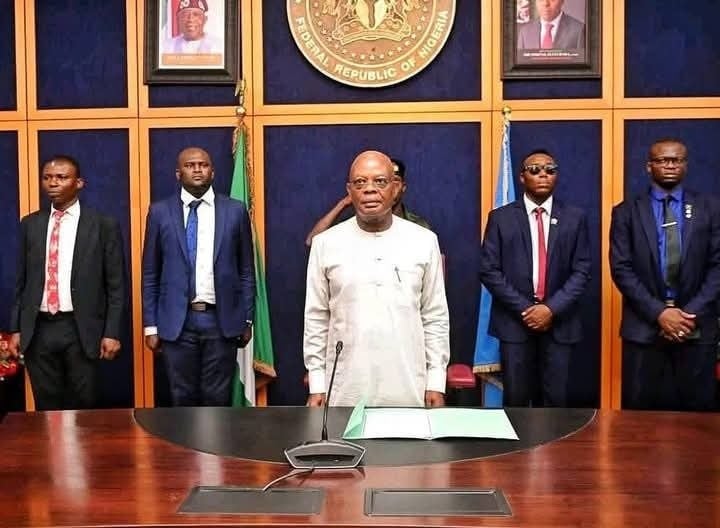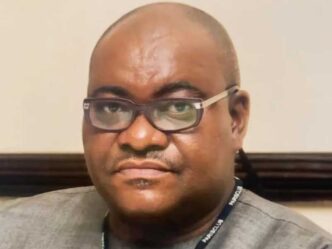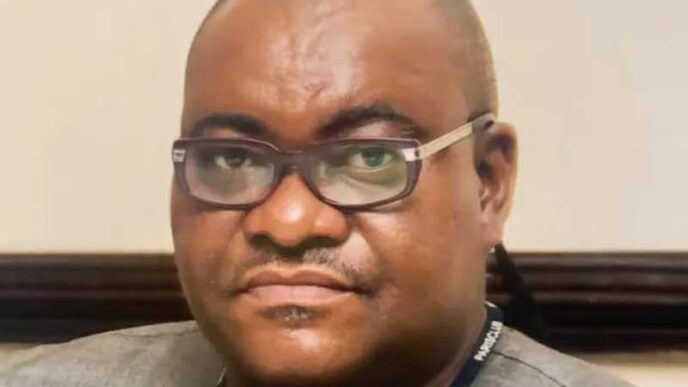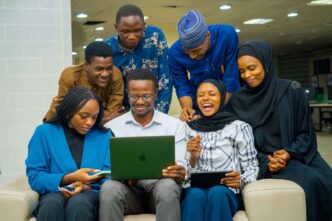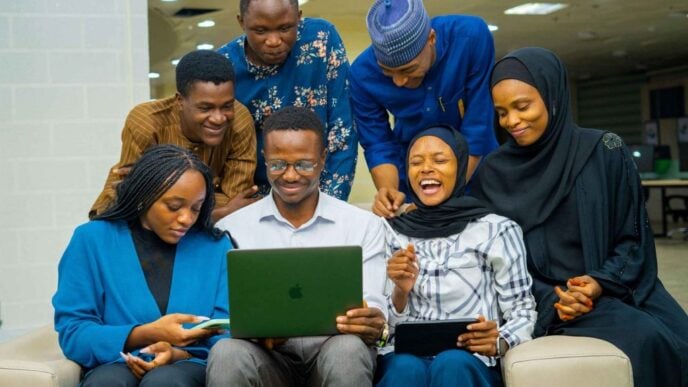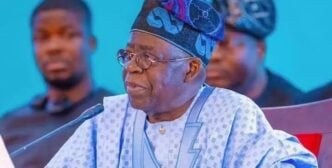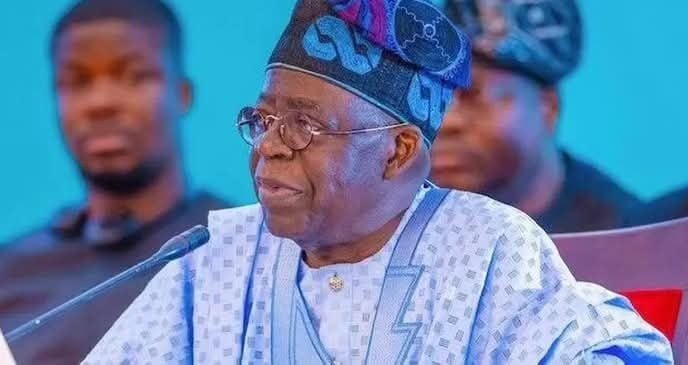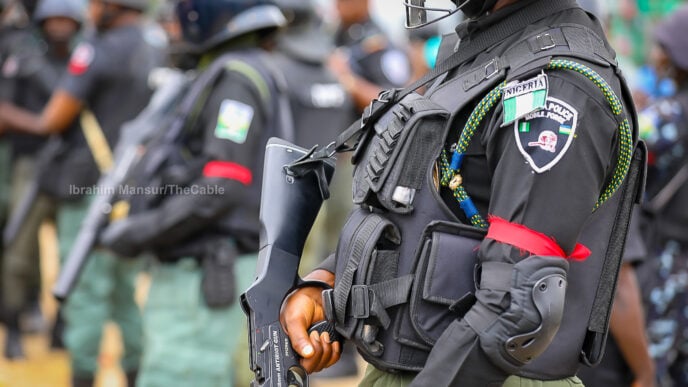Ibok-Ete Ibas (in white) is the sole administrator of Rivers state | File photo
BY WEALTH DICKSON OMINABO
Since the declaration of a state of emergency in Rivers state, Nigerians across the board have taken time to examine the government’s action; the decision of the president, the reaction of the national assembly, and the ruling of the supreme court that the president cited while making his declaration of a state of emergency and how these different actions react to shape the conflict and its impact on our democracy. As expected, comments are planked on both divides, those speaking for and against, but a critical review should show that many Nigerians were disappointed with the president’s action and went ahead to condemn the action using different frames and labels.
An analysis of many of the critical and dissenting voices regarding the declaration of a state of emergency speaks on the idea of securitisation and the danger it poses to the country’s democracy. The emergency rule is a securitisation act, which is an action invoked in times of extreme emergency. This recent action of the president highlights the deep-seated posture of the government securitising political issues and the danger it poses to the country’s democracy. Nigerian leaders have in recent times used securitisation as a tactic to boycott the rule of law and contain civil liberties, carrying out democratic actions, citing national interest and national security as emergencies. Recent examples abound where leaders have used securitisation to contain the rights and freedoms of citizens. During the last administration, President Buhari, relying on securitisation, engaged the military to stop the End Sars Protest in Lagos. The government also invoked securitisation when he banned the use of Twitter in Nigeria for many months, thereby shrinking the country’s civic space and containing the freedom of expression of citizens.
Some analysts say this government seems to have taken the baton from its predecessor by securitising political issues and civic causes. They cite the government’s use of force to quell the end bad governance protest last year, suggesting that it could cause public disorder and could be manipulated to cause insurrection in the country.
Advertisement
The Crisis in Rivers State has exposed the level at which the country is gradually working towards institutionalising securitisation acts in the political sphere. Securitisation poses a danger in democracy as it could easily label political dissent, democratic movements, and protests, as threats to national security and frame the actors as insurrectionists, justifying the use of extreme measures to contain their rights.
Securitisation, in many cases, bypasses electoral, democratic, or judicial interpretation, thereby weakening the institutions of the state and undermining the democratic values of separation of power and checks and balances. Even when checks are done, they are usually carried out as mere rituals to align with executive orders, as politics is usually the consideration and not reason. Politicians of a governing party, especially in Nigeria where weak institutions exist, are always shy to oppose the executive government at the federal level to continue to remain relevant in the scheme of things.
Securitisation also has the tendency to provoke resistance and turn political issues into serious crises and even armed conflict, automatically undermining the entire democratic structure that securitisation acts are meant to protect. Securitising political issues could lead to criminalising dissent and containment of political freedom. It also creates an atmosphere where politics is criminalised and leaves no room for dialogue but rather the use of force. Securitising political issues challenges the very fabric of our nation’s democracy and poses serious consequences for the sustenance of democracy. It waters the ground for democratic leaders to be dictatorial, circumvent the constitution at will, and undermine the institutions of the state. Securitisation of political issues, as we have seen in Nigeria in recent times, creates a false path to security—one that could threaten the democracy we enjoy, end up building strong men, and weaken institutions.
Advertisement
Nigeria, as the Giant of Africa, should be a strong moral champion of promoting democracy. Leaders must act in ways that inspire all stakeholders on the gains of democracy and not make decisions that will inspire hope in the heart of sections that there is an alternative route to democracy.
Going forward, Nigerian leaders and other stakeholders in the democratic space must reduce the practice of securitising political issues in the polity, which are inimical to the peace and progress of our country. Actions such as heavy deployment of the military during elections, obstruction of civic causes like protests, peaceful demonstrations, arrests, threats, and detention of opposition voices through pretentious securitising acts should be minimised. The arbitrary securitisation of civil issues undermines civil liberties and traps democracy in a web of powerful interests.
Those at the helm of affairs, especially those saddled with the responsibility to manage and coordinate our security in the country, must be patriotic, bold, and committed to doing the right things and pursuing good governance. The optics in Rivers State are worrisome, as some analysts have pointed out, as it all suggests that the emergency was more of a power game and not necessarily a security issue, as even the Senate offered to set up a reconciliatory committee to reconcile the political interests. That sends a wrong signal on the politicisation of security measures, an action that could dampen the morale of not just Rivers people but also security operatives if they know that security briefs and measures are influenced by politics rather than patriotic service.
Another bad omen is the appointment of a military officer as the Chief of Staff to the Sole Administrator, Ibok-Ete Ibas. These actions, some say, are incentivising militarism. Another worrisome trend is the anxiety being created by the sole administrator through his policies, which are said to be disrupting governance and creating further animosity in the polity. It is being reported that some senior civil servants are being pressured to resign. Already, the head of service has resigned, and another has been appointed. Boards and parastatals have been dissolved, and local government administrators have also been asked to give account statements and show sources of internal revenue in the last two years. These actions of the sole administrator are polarising, provocative, and inciting, and amount to an overreach of his responsibilities.
Advertisement
Citizens are still wondering how to connect the dots between a sole administrator appointed to restore peace and his action of dissolving boards and parastatals that are constituted to ease governance. This action will halt governance and impact the well-being of the people. Again, what is the inspiration behind demanding a statement of account of local governments and their source of revenue? One will not be surprised if the administrator goes ahead to appoint or organise a sham local government election just to hand over the political structure to some politicians.
Ibas and other stakeholders should be circumspect in their actions and refrain from actions that could cause disaffection among the Rivers people and the Niger Delta. What we are witnessing in Rivers State is negative peace; they have a responsibility to win the hearts of aggrieved parties and actors towards lasting peace. They must not be carried away by the normalcy of calm and order since the declaration of a state of emergency.
Such calm could be an early warning of impending chaos; actors weighing their risk and threat towards carrying out an asymmetrical attack or it could be a genuine embrace of peace by the people. Whatever the reality is, this window offers an opportunity to de-escalate tension and not escalate it. It is a moment to work towards resolving the political impasse in the State for the benefit of the people and not a time to pursue a political agenda to the detriment of the peace and progress of the State.
For Nigerians, we owe ourselves and our country a responsibility to be patriotic and alert to trends that could impede our civil liberties, peace, and collective access to justice. We shouldn’t normalise authoritarian action and yield to being passive in the face of authoritarian waves. We have a duty to cast and bind such motives and actions, lest we lose our freedom, hope for justice, and the promises of equality and equity, which are the essence of democracy.
Advertisement
Ominabo is a journalist and researcher on governance and security. He can be reached via [email protected]
Advertisement
Views expressed by contributors are strictly personal and not of TheCable.
Add a comment
